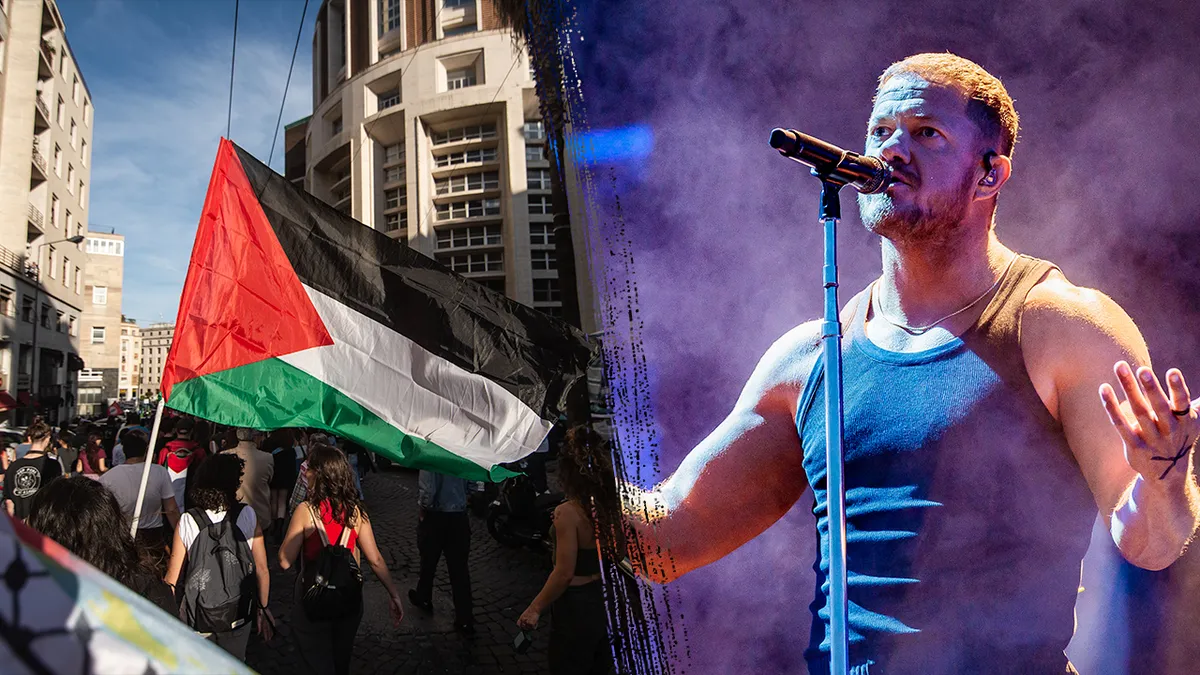Imagine Dragons: A Symbol of Solidarity or a Target of Controversy?
In a world where musical performances often serve as a platform for political expression, the rock band Imagine Dragons has once again captured headlines, this time for a spontaneous act during their recent concert in Milan. Frontman Dan Reynolds, known for his outspoken views and humanitarian efforts, waved a Palestinian flag while addressing the crowd, igniting a wave of reactions across social media platforms.
Context of the Performance
The concert at the Mediolanum Forum came fresh on the heels of a highly criticized performance by the band in Tel Aviv. This backdrop has fueled discussions about the band’s stance on the Israel-Palestine conflict, with many fans and critics eager to interpret the meaning behind Reynolds’ gesture.
A Gesture of Solidarity
Waving the Palestinian flag during a live performance can be seen as a potent symbol of solidarity in a tumultuous time. The Israeli-Palestinian conflict has been a focal point of intense global debate, with passionate opinions on both sides. By embracing the Palestinian flag on stage, Reynolds has thrust the topic into the limelight.
“I want to use my platform for good,” Reynolds stated in a post-concert interview. “The suffering of people in Palestine is a reality that demands attention and awareness. I believe music can transcend boundaries and foster understanding.”
The Internet Reacts
As soon as the video of the incident began circulating on social media, reactions flooded in. Supporters praised Reynolds for his bravery, lauding the band for their commitment to social justice. Tweets and Instagram posts began trending with hashtags like #ImagineDragons and #DanReynolds, many declaring their support for the frontman’s bold statement.
However, not all reactions were positive. Critics quickly voiced their disapproval, with some calling for boycotts of future Imagine Dragons events. Many began to question the appropriateness of mixing music with political statements, arguing that entertainment should remain separate from divisive issues.
Social Media Divided
The polarization around the flag waving exemplified the complexities of public opinion surrounding modern celebrity activism. Supporters argued that celebrities have the ability—and sometimes the obligation—to advocate for marginalized groups. “Music is a vehicle for expression, and we live in a day and age where artists must take a stand,” tweeted one fan.
Conversely, critics pointed out that waving a flag can also be interpreted as oversimplifying a multifaceted geopolitical issue. “How can we expect musicians to represent our complex world accurately?” questioned a user, sparking debate on the social media platform Reddit.
Fans and Followers Weigh In
The profound split in online responses unveils deeper layers of societal sentiment regarding celebrity activism. Many fans expressed feeling disillusioned by potential commercial interests driving change, while advocates for political statements argued that artists have a unique ability to engage fans in worldwide issues.
One Instagram user commented, “I love Imagine Dragons for their music, but introducing such a heavy topic onto the stage can alienate some fans.” This statement reflects a growing concern among audiences over how much they want artists to address controversial subjects in their work.
Beyond the Concert: The Bigger Picture
The incident at the Milan concert is a microcosm of ongoing tensions, not just within the music industry but also within society at large. Artists like Reynolds face the challenge of balancing their audience’s diverse perspectives while staying true to their beliefs.
Moreover, it raises critical questions about the role of fame in activism. Are entertainers merely performers, or do they have a moral imperative to address social issues? For Reynolds and Imagine Dragons, the gesture signals an evolving understanding of their influence.
The Band’s History with Activism
Imagine Dragons is not new to social causes. Reynolds has previously spoken out on mental health issues, LGBTQ rights, and more recently about climate change. This latest act aligns with his history of promoting social awareness through the band’s music and public presence.
The band’s previous endeavors include founding the nonprofit organization, “The Tyler Robinson Foundation,” focused on supporting young musicians in need. Their philanthropic efforts demonstrate a commitment to using fame for social good, so the flag-waving incident fits into a larger narrative of activism tied to their identity.
Implications for Future Performances
As the fallout from the Milan concert continues, many wonder how this incident will shape future performances and the band’s relationship with their fan base. Would they continue to incorporate political themes into their shows, or would this experience lead them to pull back from contentious issues?
The answer remains to be seen. However, fans are likely to follow closely as Imagine Dragons navigate these complex waters. Whatever their future decisions may be, it is clear that they have provoked essential discussions about art, activism, and responsibility in the modern age.
Conclusion
Imagine Dragons’ action in Milan is emblematic of the challenges modern artists face in a politically charged environment. With the internet ablaze with opinions, the event raises important questions about the relationship between art, celebrity, and activism. It also underscores the divisions within our society, highlighting the fine line artists walk when they choose to make a political statement.
As audiences grapple with these dilemmas, one thing remains clear: music will continue to be a powerful vehicle for change, and artists like Dan Reynolds will undoubtedly keep using their platforms to amplify their voices—whether in support of Palestine or any other cause they believe in.







